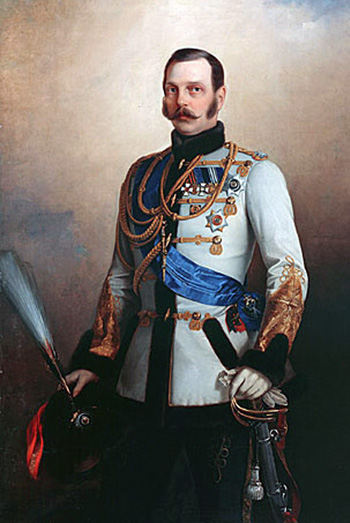
Alexander II (1855-1881)

After the unrelenting autocracy of Nicholas I, the “Iron Tsar”, liberal welcomed the reign of his fair-minded son Alexander II, who was born in Moscow on April 17, 1818, and was crowned in the Dormition Cathedral of the Moscow Kremlin on August 26, 1856 after the death of his father, when Russia emerged from war with a dire need for thorough changes and Alexander II implemented important reforms. The Emperor signed the Edict of Emancipation, abolishing serfdom as well as made changes in national, military and municipal organization. He also rethought foreign policy: in 1858 the Amur territory was incorporated; in 1859 the East Caucasus was submitted; in 1864 the West Caucasus was conquered; in 1865 Tashkent was taken; in 1868 Samarkand and Bokhara were taken; in 1873 Khiva was taken; in 1876 Kokand was incorporated – thus Alexander established a giant empire stretching from Pacific to the Baltic. At the same time in 1867, he sold Alaska and the Aleutian Islands to the United States and ceded the Kurils to Japan. The reign of Alexander II was also marked by the technological progress: since peasants were to buy their land at far from advantages terms, they prefer to move to big cities to work in factories. As a result the number of suburban factories skyrocketed from 130 to 200 within a mere five years since the abolition of serfdom. Small steamboats began regular voyages along the Neva and the many small rivers and canals to take commuters from island to island and draw firewood barges. Petersburg port was transported from the Vasilievsky island east end to the Neva estuary. Kerosene street lamps were replaced by gas, while kerosene lamps appeared at homes instead of candles. Thus the city itself and the life of its inhabitants were improving, although not all people were totally content with these changes. Secret revolutionary societies emerged as the ranks of people dissatisfied with Alexander’s reforms were swelling. Several extremist members of the most active organisation, Land and Freedom, meant to replace the regular state with a voluntary federation of peasant communities, set up an independent party called People’s Will and undertook several attempts to kill the tsar. On March 1, 1881 when Alexander was inspecting regiments at the Mikhailovsky castle, a bomb was thrown in his carriage as he went along the Griboedov Canal towards the castle, and the tsar was mortally wounded. His son Alexander III ascended the throne.
|
Copyright © 2004-2005 Palytra Travel
All rights reserved |
Website development |

